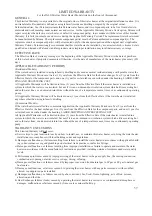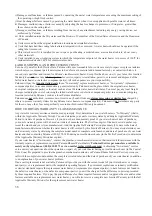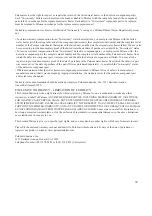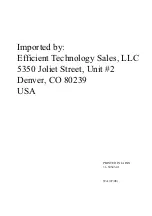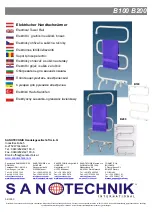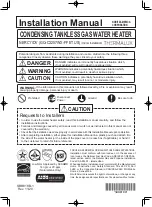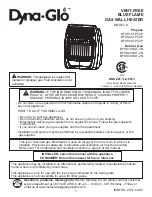
30
Venting System Inspection
The venting system of a direct vent water
heater should be inspected annually to
ensure all of the vent sections are secure
and air-tight.
It is recommended that qualified service
personnel familiar with Category III
venting inspect the venting system.
Check vent connection joint sections with
a solution of soapy water to assure air-
tightness while the unit is operating.
Bubbles around a joint connection
indicates a seal leak. Refer to page 9 for
vent sealing instructions.
DO NOT
operate the unit if vent system
shows signs of leaking exhaust.
Check to make sure that the air intake
opening and vent outlet on the termination
has not been blocked or contain debris.
Burner Inspection
Visually inspect the main burners
annually.
Through the sight glass, inspect the burner
flame with the main burner off and inspect
the main burner while firing.
If any unusual burner operation is noted,
the water heater should be shut off until
qualified service assistance can be
obtained.
CAUTION: For your safety, burner
inspection and cleaning should be
performed only by qualified service
personnel.
For cleaning, a vacuum cleaner can be
used on the burner.
Proper burner pattern.
Care and cleaning of the water heater:
Vacation and Extended Shut-Down
If the water heater is to remain idle for an
extended period of time, the power and
water to the appliance should be turned
off.
The water heater and piping should be
drained if they might be subjected to
freezing temperatures.
After a long shut-down period, the water
heater’s operation and controls should be
checked by qualified service personnel.
NOTICE: Refer to the Freeze
Protection Section on page 31.
Housekeeping continued
CLEANING THE WATER HEATER
AND REMOTE CONTROL(S):
l
Make sure the unit is OFF and the
electrical power supply has been
disconnected.
l
DO NOT
scrub the appliance with a
brush.
l
Use only mild soapy water, other
cleaners may damage the surface of the
water heater.
l
DO NOT
remove any label including
the rating plate while cleaning or
servicing.
l
DO NOT
splash water on the remote
controls when cleaning.
Blue Flame
Condensate Trap Inspection
On a regular basis, inspect the condensate
trap to ensure there is enough water in the
trap and the condensate is draining
properly.
Ensure that condensate is disposed of per
local codes and regulations.
CAUTION: Do not operate
without the condensate trap
connected to the vent and routed
to the proper drain.






















